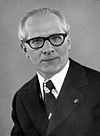General elections were held in East Germany on 17 October 1976. Out of 591 candidates of the single-list National Front for the 500-seat Volkskammer, 500 were elected from the highest number of votes received in each of the allocated lists, and 91 who lost their elections became substitute deputies. At its first session on 29 October, the Volkskammer elected Willi Stoph as Chairman of the Council of Ministers, while Erich Honecker, General Secretary of the ruling Socialist Unity Party, was elected Chairman of the Council of State. The allocation of seats remained unchanged from previous elections.
| ||||||||||||||||||||||
500 seats in the Volkskammer | ||||||||||||||||||||||
|---|---|---|---|---|---|---|---|---|---|---|---|---|---|---|---|---|---|---|---|---|---|---|
| Turnout | 98.6% | |||||||||||||||||||||
| ||||||||||||||||||||||
| ||||||||||||||||||||||
Results
edit| Party or alliance | Votes | % | Seats | +/– | |||
|---|---|---|---|---|---|---|---|
| National Front | Socialist Unity Party of Germany | 11,245,023 | 99.86 | 127 | 0 | ||
| Free German Trade Union Federation | 68 | 0 | |||||
| Christian Democratic Union | 52 | 0 | |||||
| Liberal Democratic Party of Germany | 52 | 0 | |||||
| National Democratic Party of Germany | 52 | 0 | |||||
| Democratic Farmers' Party of Germany | 52 | 0 | |||||
| Free German Youth | 40 | 0 | |||||
| Democratic Women's League of Germany | 35 | 0 | |||||
| Cultural Association of the GDR | 22 | 0 | |||||
| Against | 15,307 | 0.14 | – | – | |||
| Total | 11,260,330 | 100.00 | 500 | 0 | |||
| Valid votes | 11,260,330 | 99.98 | |||||
| Invalid/blank votes | 2,616 | 0.02 | |||||
| Total votes | 11,262,946 | 100.00 | |||||
| Registered voters/turnout | 11,425,194 | 98.58 | |||||
| Source: IPU, Nohlen & Stöver[1] | |||||||
References
edit- ^ Dieter Nohlen & Philip Stöver (2010) Elections in Europe: A data handbook, p792 ISBN 978-3-8329-5609-7
